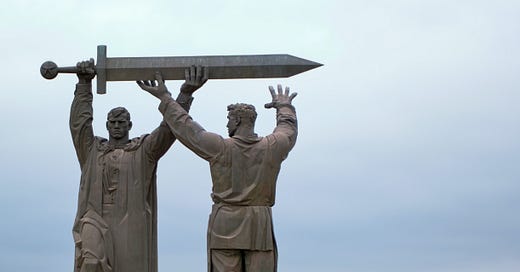"Being Armed"
We often hear the term "being armed," usually associated with conflict or defense, but did you ever stop to think about its deeper implications? Today, let's delve into a unique interpretation of this
We often hear the term "being armed," usually associated with conflict or defence, but did you ever stop to think about its deeper implications? Today, let's delve into a unique interpretation of this Masonic Principle
Imagine yourself in the midst of preparing for a huge project or task, but you feel unprepared and under-equipped. It's an unnerving sensation, isn't it? A sense of trepidation, anxiety, and uncertainty might overwhelm you. But hold on a second; there is a way out, a way to turn the tide and bring the situation under control.
"Knowledge is like a sword, it can be used for good or evil.
It's up to the one who wields it." - Dalai Lama:
Take a step back and let's look at things from a fresh perspective. In Freemasonry the principle of "being armed", symbolic of duty to protect the Lodge and its proceedings. However, this isn't merely a physical obligation. The duty is not just about holding a literal sword but also about upholding the Lodge's integrity, ensuring readiness, and demonstrating a deep sense of responsibility.
The state of "being armed," as portrayed in this scenario, goes beyond the traditional perception of physical preparedness. It resonates with each one of us in our daily lives. We've all experienced situations where we've felt exposed, vulnerable, or caught off-guard due to a lack of preparation or insufficient resources.
The term "armed" stems from the Old English word "earm," which signifies a weapon or armament. As the language evolved, so did the term, transforming into the Middle English "arm," embodying the broader sense of defense or protection by the 14th century. So, when we say someone is "armed," it indicates that they're furnished with the tools (literal or metaphorical) necessary for effective action or defence.
This fascinating history of the word "armed" unveils layers of meanings that have been imbued over centuries. It provokes a thought: Are we truly "armed" to face the challenges in our personal and professional lives?
Picture a future where you are completely equipped and ready for any task or challenge that comes your way. A future where uncertainty is replaced with confidence and fear with courage. How empowering does that sound?
"Give me six hours to chop down a tree
and I will spend the first four sharpening the axe."
- Abraham Lincoln
"Being armed" in the Masonic context provides us a blueprint for this positive future. It teaches us to be ready, to embrace our responsibilities wholeheartedly, and to uphold our values and integrity with unyielding resolve. It encourages us to be prepared, resilient, and adaptable.
How do we transition to this state of readiness and resilience? Here are some tactical and practical steps:
Understand Your Role:
Recognise the responsibilities of your position, whether at work, home, or in any social setting.Gather Necessary Tools:
Equip yourself with the physical resources needed for your role. If you're a writer, your tools might be a computer and a reliable grammar checker; if you're a chef, your tools might be high-quality cookware and fresh ingredients.Acquire Knowledge:
Pursue learning with enthusiasm. Read books, attend workshops, listen to podcasts - absorb knowledge from wherever you can.Develop Skills:
Turn your knowledge into practical skills. Experiment, practice, refine, and perfect.Adapt to Challenges:
Be resilient. Learn to pivot and adapt when faced with obstacles or unexpected changes.Uphold Values and Integrity:
Stay true to your principles, maintain your ethical standards, and strive to do your best at all times.Continuous Learning:
Embrace a mindset of lifelong learning. Always be on the lookout for opportunities to learn, grow, and improve.
The Masonic principle of "being armed" extends beyond mere physical preparedness, encompassing knowledge, skills, adaptability, and a commitment to lifelong learning. It prompts us to face our responsibilities with resilience and courage, ensuring we're always equipped and alert.
"By failing to prepare, you are preparing to fail."
-MW Bro Benjamin Franklin PGM, President of the United States
The principle serves as a practical guide for everyday life, inspiring us to apply this readiness in all areas, from professional duties to personal growth. It encourages us to be prepared to meet challenges, protect our values, and fulfill our responsibilities effectively.




